Major project
It’s Grow Time - Teaching aspiring growers how to grow their… [Read more]
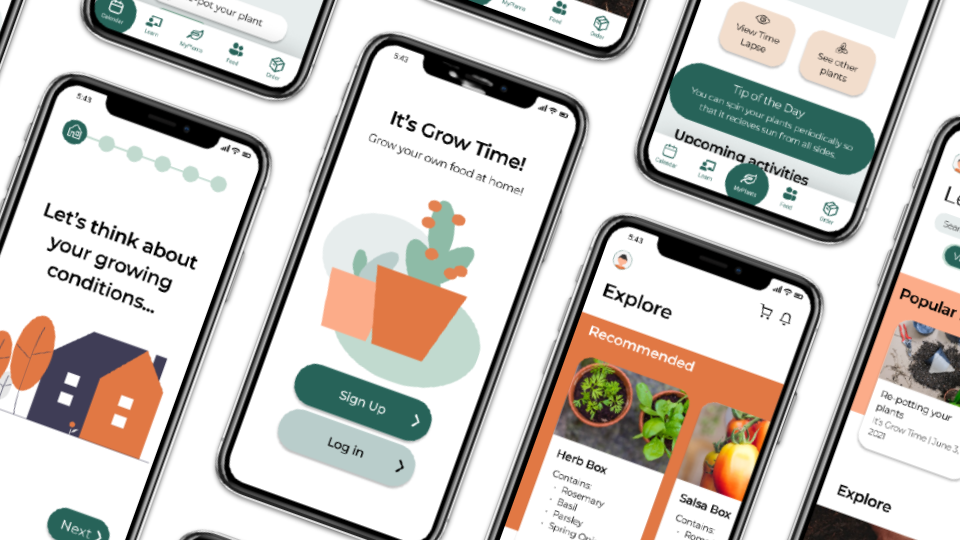
It’s Grow Time helps people grow fresh produce in their own homes.
This educational app helps aspiring gardeners grow their own food at home by supplying the tools necessary to begin growing and providing them with the knowledge to maintain plants throughout the growing process.
Users can explore a variety of Grow Boxes to purchase which contain all the materials necessary to start growing a garden in their own home. When they receive their plants, the app gives users a calendar of predicted growing activities for each plant and sends notifications to remind users when to care for their plants in order to ensure successful growth.
The app uses postcodes to deliver plants from local farms and nurseries when possible. Information about where each plant comes from is available in each Grow Box to inform users about how they are supporting local businesses.
With opportunities to connect with other growers within the app, helpful videos, and interesting articles available to view, users can learn as they grow!
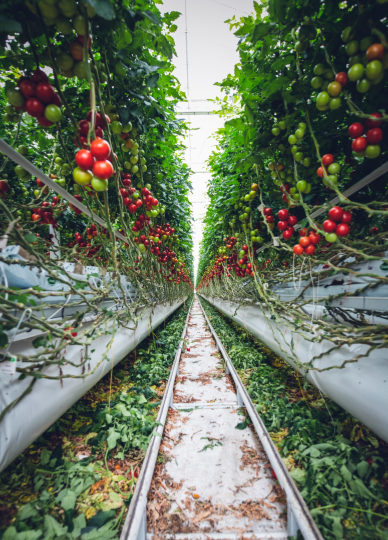
The Challenge
The Discover stage of this project aimed to identify the barriers that prevent people from growing their own food at home. The purpose of pursuing this research was to explore possible solutions to environmental problems concerning food miles and transparency about the origins of the produce we eat.
To help reduce the environmental impact associated with food production and increase food transparency, people can grow food at home.
To align the design solution with user goals, development was focussed on how a rewarding home gardening experience can be achieved through education, and how people can gain more control over what they eat and support local farms.
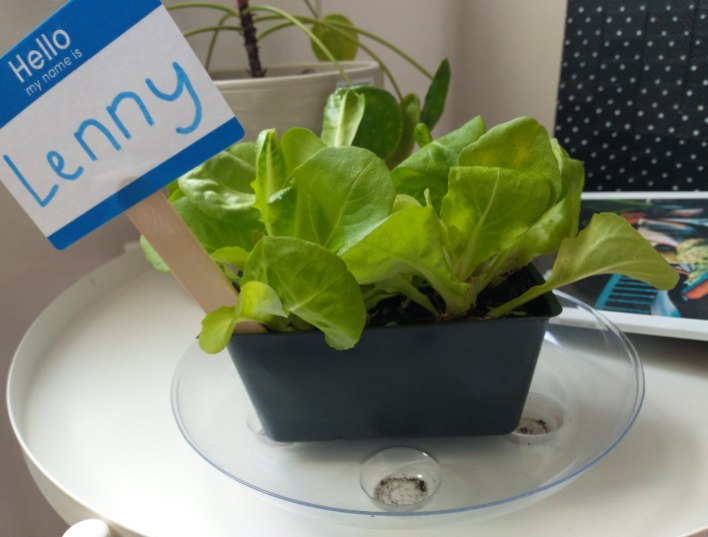
User Research
Qualitative research was conducted to uncover perceived pain points about home gardening and understand behaviours when it comes to caring for produce plants. Behaviours and attitudes were thoroughly investigated to understand what prevents people from growing their own food at home in order to design a solution to encourage people to grow their own food at home.
- Semi-structured interviews were conducted with eight participants to understand thoughts and attitudes about growing food at home.
- An expert horticulturist was interviewed to gain contextual insight into what makes indoor growing successful and unsuccessful.
- A diary study was conducted over the span of three weeks with five participants to gain insight into how people care for their plants and how attitudes and behaviours evolve over time.
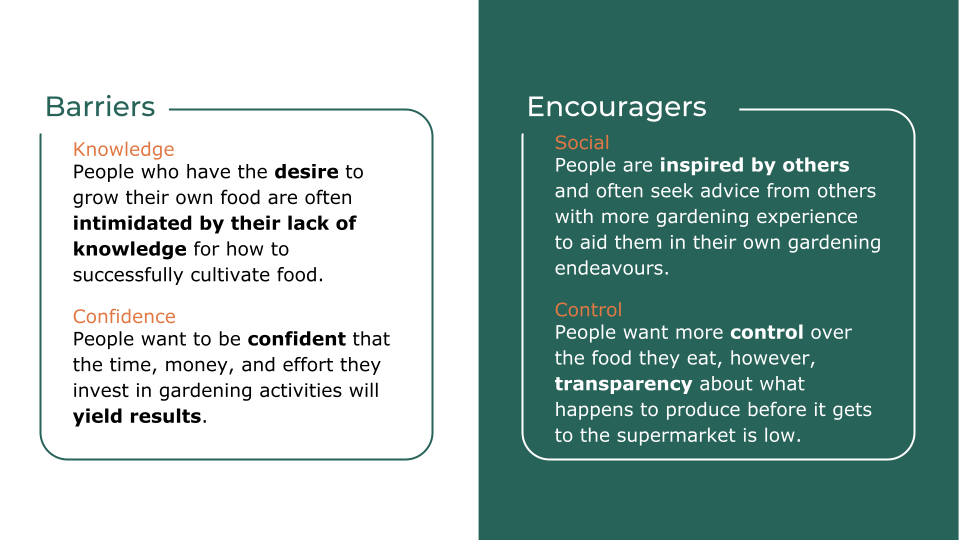
Key Insights
Data was rigorously analysed using affinity mapping and thematic analysis. Results indicated barriers that prevent people from growing food at home as well as factors that encourage growing food. The following four key actionable insights helped to drive design development:
Barriers
- People who have the desire to grow their own food are often intimidated by their lack of knowledge for how to successfully cultivate food.
- People want to be confident that the time, money, and effort they invest in gardening activities will yield results.
Encouragers
- People are inspired by others and often seek advice from others with more gardening experience to aid them in their own gardening endeavours.
- People want more control over the food they eat, however, transparency about what happens to produce before it gets to the consumer is low.

Design Iteration
Design development involved reframing insights into opportunities in the form of How Might We statements. These statements were prioritised on a matrix based on their potential to encourage growing food at home and the potential for enhancing the user experience.
The Jobs To Be Done Framework helped generate user requirements, which translated into the development of key features. These features were then prioritised using the MoSCoW method.
To ensure user-centred design, low-fidelity prototypes were generated and tested with users. Multiple design iterations of varying fidelity were developed and tested and feedback from testing was used to develop a final design to align with user goals.
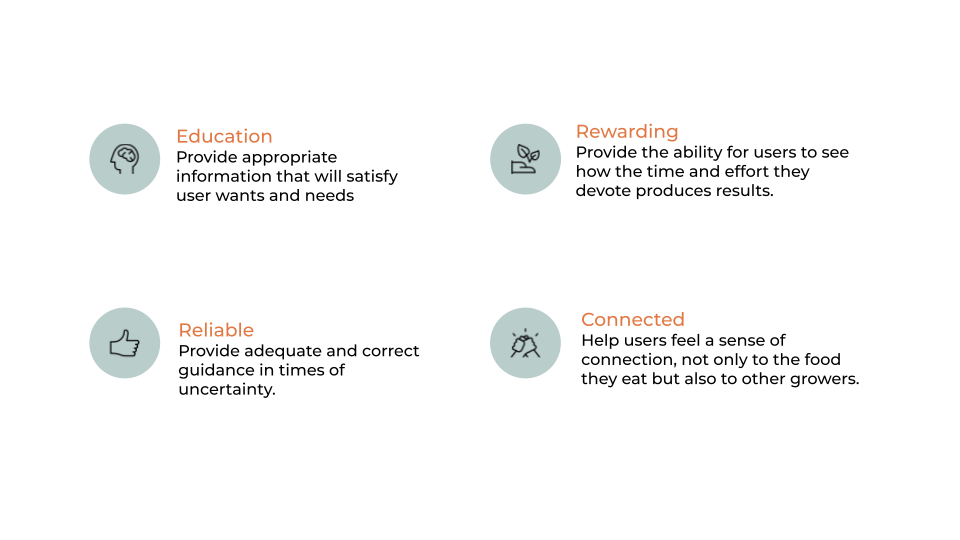
Experience Design Principles
Experience design principles were developed based on primary research to define users' fundamental goals and help to create a meaningful product for aspiring growers.
Sophie Bird
I am an aspiring UX designer interested in transforming interactions and facilitating positive experiences between people and products/services.
In 2020, I completed a BS in Psychology in Washington State, USA. As an undergraduate, I was exposed to courses involving User Experience which piqued my interest in design and led me to pursue a postgraduate degree in UX Design. As a hodophile with a desire to expand my cultural frame of reference, I decided to fly across the pond to complete my studies at Loughborough University.
Coming from a psychology background helped me develop a keen interest in behaviour, and my postgraduate studies have nurtured this interest through the practice of understanding user behaviour in a design context. I value the interdisciplinary aspect of UX design and feel that this Masters course has shaped the way I view the world and how people interact with it. I am looking forward to opportunities where I can use a design approach and mindset to meaningfully contribute to creating viable solutions to social problems.
Major project
It’s Grow Time - Teaching aspiring growers how to grow their own food at home.
Awards
Upon completion of UXathon 2020, a day-long design sprint competition at Loughborough University that involved collaboration with start-ups based in Hong Kong, my team was awarded Best Branding for our design. Our app, DeLight, is a food subscription and meal-planning app which helps working individuals achieve their health and fitness goals, promoting a healthy and efficient lifestyle.
I also participated in the Ford Fund Smart Mobility Challenge 2020, which took place over several weeks. The challenge was to create a solution to overcome mobility obstacles, and my team focussed on the reduction in physical activity associated with working from home as a result of the Covid-19 pandemic. My team was selected as a winner for our concept, Home ACTive, which encourages people to be physically active throughout their day in a work from home environment without sacrificing their productivity.